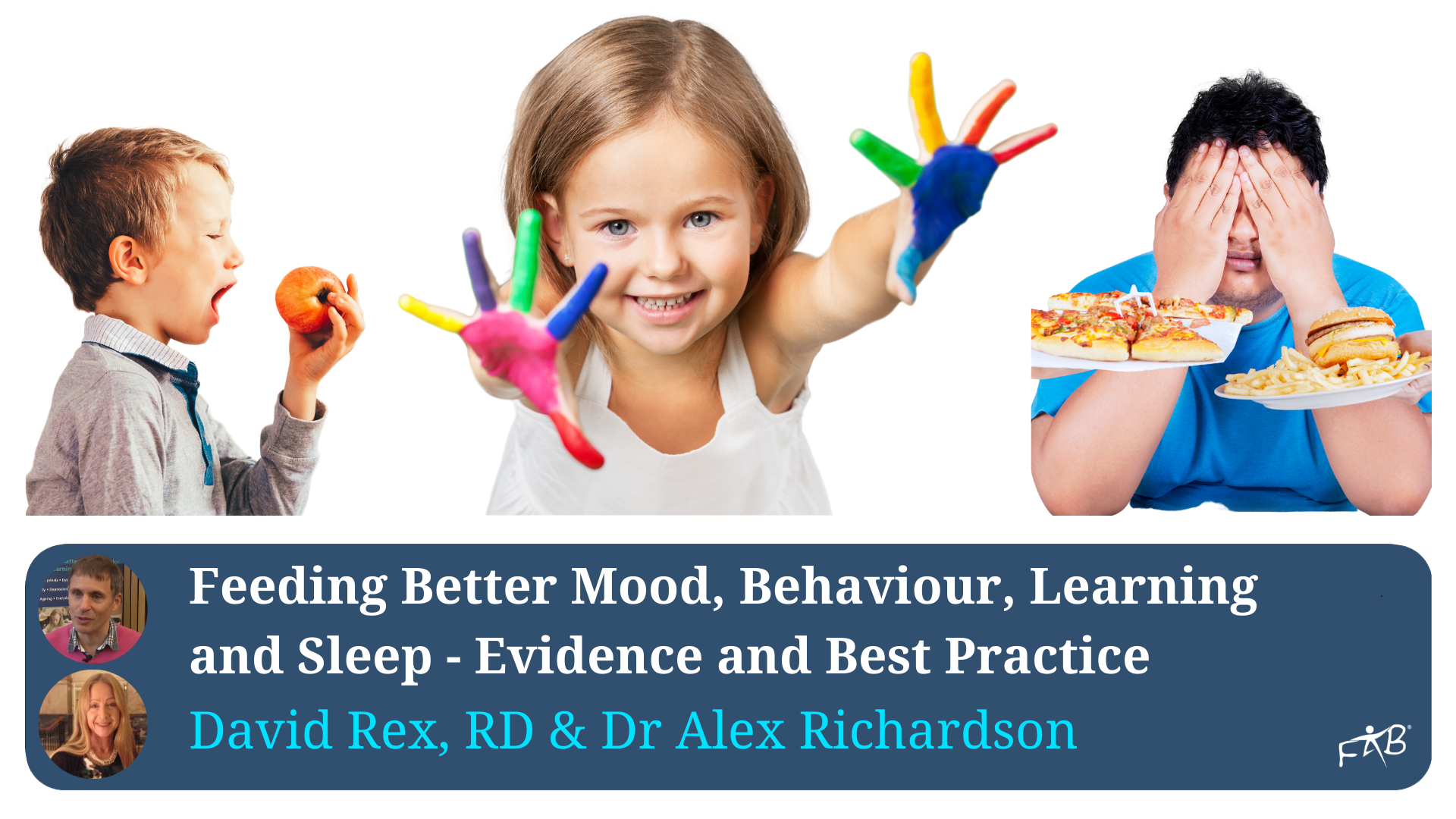ADHD, Autism and Related Conditions
Bookmark this page - and return soon for another video from the FAB Archive!
(Or sign up to our newsletter and we'll notify you).
In this video
Dr Rachel Gow addresses:
- What is ADHD?
- Some of its characteristic behaviours and symptoms.
- Common ADHD myths.
This clip is taken from 'Nutrition for ADHD and Neurodiverse Minds' which is available as a one off purchase here or to FAB Associates via the FAB Associate Library.

ADHD is very frequently in the news, but most media coverage tends to generate more heat than light – and this especially applies to the relevance of nutrition and diet.
More FAB Research updates and expert comments on this highly controversial issue are coming soon, so stay tuned. Meanwhile:
In this video
David Rex, RD explains:
- There is no diet that will “cure” autism – and no “one-size-fits-all” when it comes to children’s nutrition and diet.
- However, many parents do report improvements in the sleep, mood and learning of their autistic child following expert clinical assessment to help them identify and modify some aspects of their child’s diet.
- Healthier food choices can also benefit children in the general population; and in educational settings, teachers often see noticeable improvements in children's behaviour and learning when they consume healthier foods.
Hear more from David Rex in 'Feeding Better Mood, Behaviour, Learning and Sleep' which is available as a one off purchase here or to FAB Associates via the FAB Associate Library.

NEW CHILDREN'S RESEARCH STUDY
Can Omega-3 help children's mood,
attention, behaviour or sleep?
> Register Your Interest <
No formal diagnoses are needed for a child to take part.
Our aim is to find out if supplementing children with the long-chain omega-3 fatty acids EPA and DHA (from fish oils) really can help children who have difficulties with mood, behaviour and/or attention to feel better, behave better, and learn better.
Previous studies of these omega-3 have already shown benefits for children with one or more of the following kinds of difficulties (whether these are mild/moderate or severe):
- ADHD – hyperactive and/or impulsive behaviour, attention and concentration problems
- Autism Spectrum Disorders – poor social skills, communication and/or behaviour problems
- Anxiety and Mood Disorders – difficulties with emotional self-regulation, sensitivity to stress, low mood and/or mood swings
Preliminary evidence also shows that supplementing these omega-3 may improve:
- Sleep problems – including difficulties getting to sleep, waking up on time in the morning, and/or night-time sleep disturbances
Find out more
All of these kinds of difficulties very often overlap in the same child. And improvements in one area, such as sleep, may help to improve others, like mood and anxiety - or vice versa.
A major aim of this study is therefore to find out how supplementation with omega-3 may affect each of these areas – and their interactions with each other – as well as children’s wellbeing in general.
IMPORTANTLY
- All measures can be completed ONLINE
- Supplements are delivered by post, so no travel is required
- The study is open to children living anywhere on the UK mainland
It is open to children who have at least some difficulties in one or more of the areas described above, and who are:
- aged between 6 and 12,
- generally in good health
- willing and able to take a food supplement for 12 weeks (This involves taking 3 small capsules daily with food. Guidance and tips on how to achieve this are available if needed.)
If you’d like more information, please register your interest below and we'll be in touch.
Please help us if you can:
- by simply sharing details of this new study with parents, teachers, psychologists, GPs, social workers - or anyone else you may know who has – or who works with - children aged 6-12 years who have any difficulties with behaviour, mood, learning or sleep.
- please let us know via this feedback form
Register Your Interest
Would you like to know more about this study?
Provide your details below and we'll be in touch to answer any questions you may have and guide you through the process.
We'll also include you in our e-alerts which include a range of free factsheets and infographics providing helpful and informative resources in a pocketsize form.
Have a question about this topic?
Let us know yours questions and comments and we'll do our best to answer them here!


